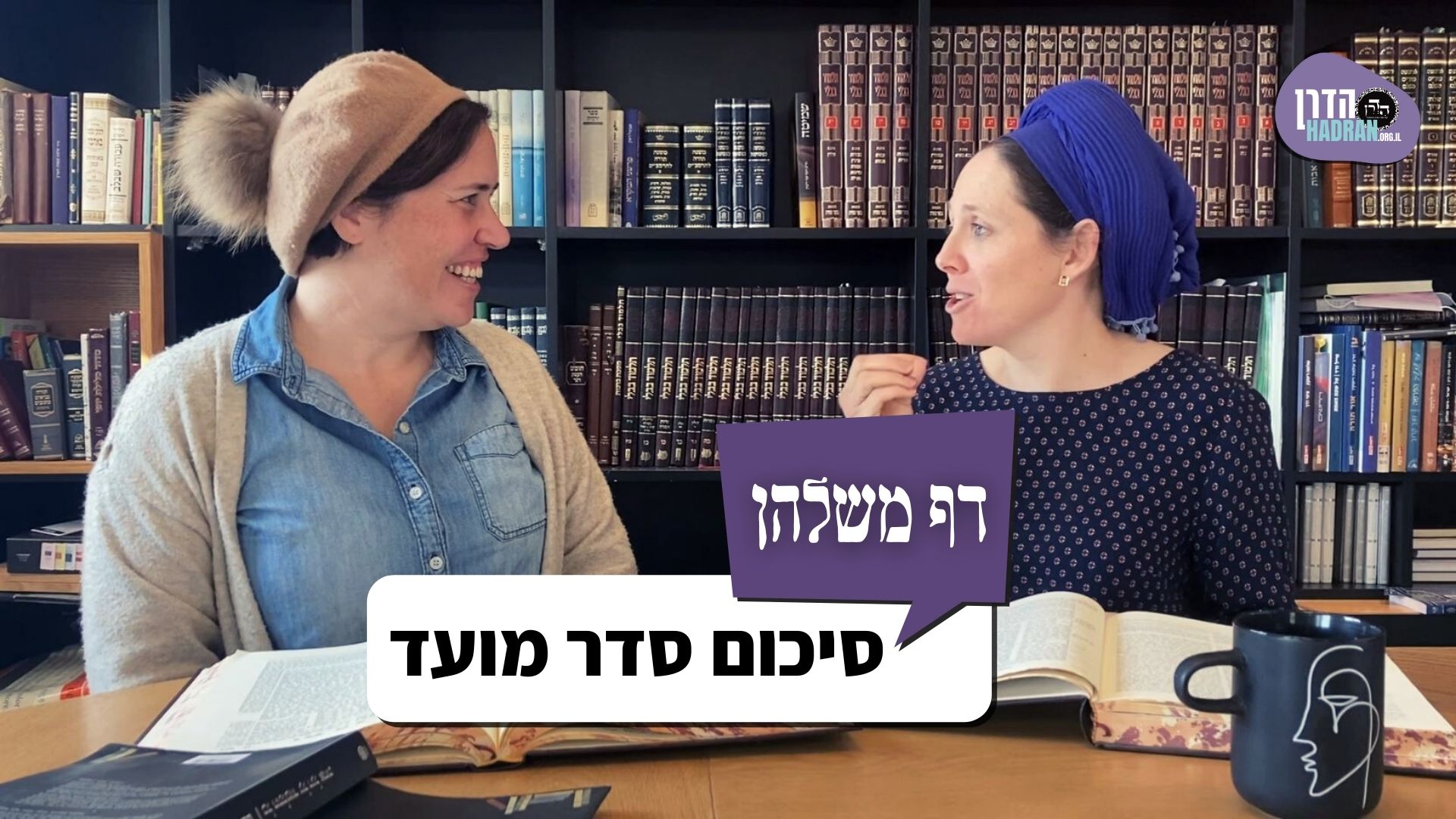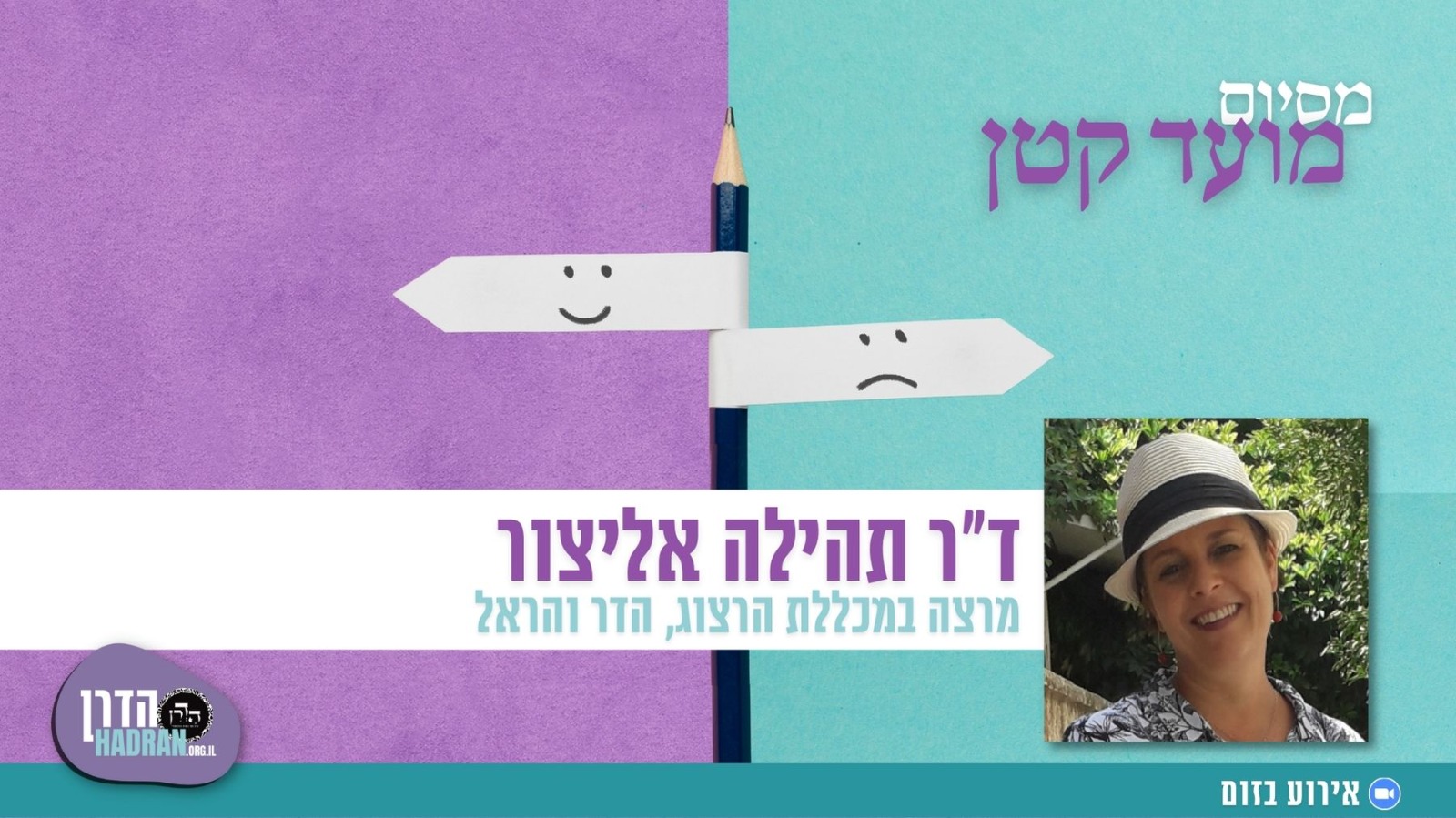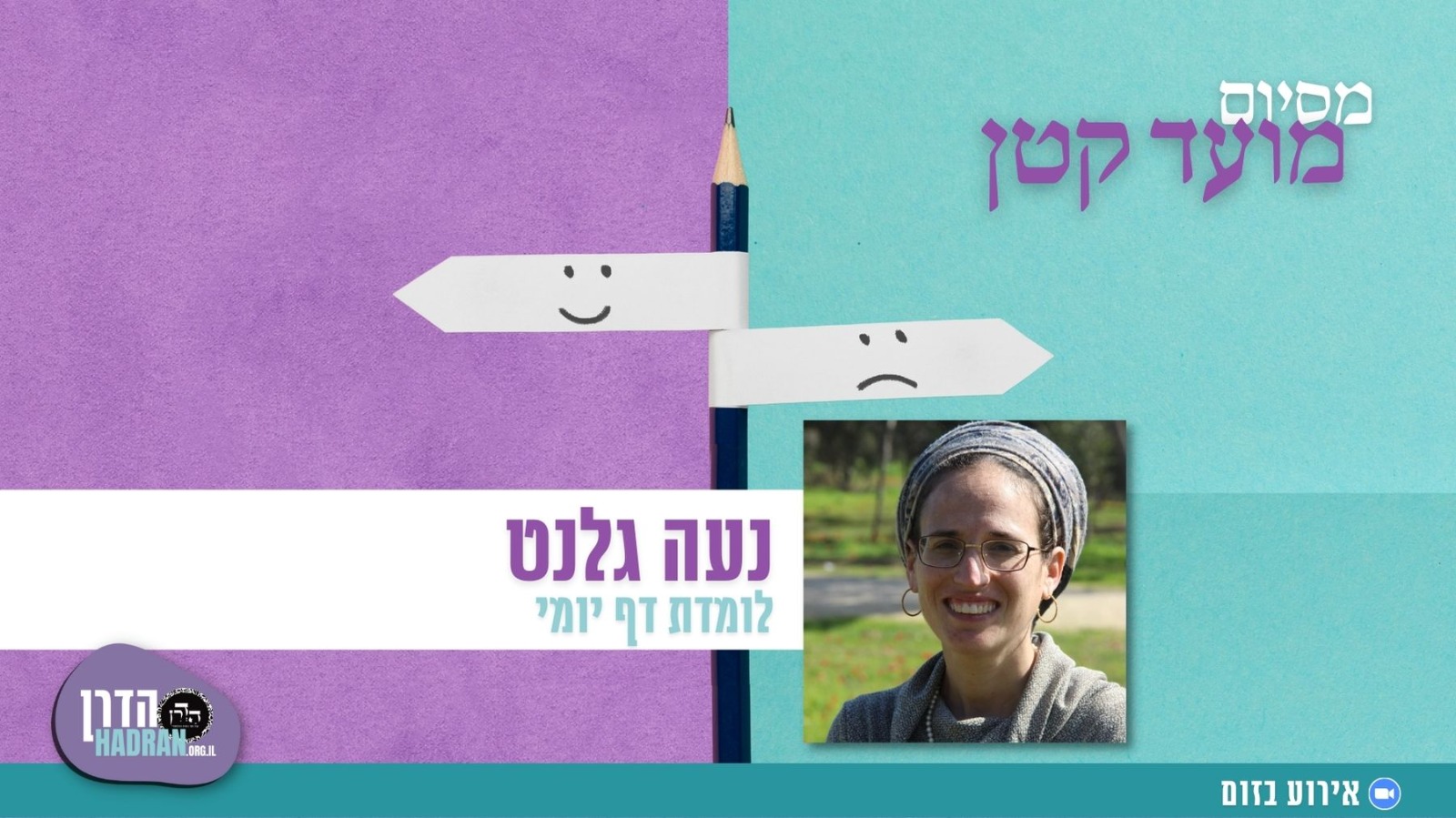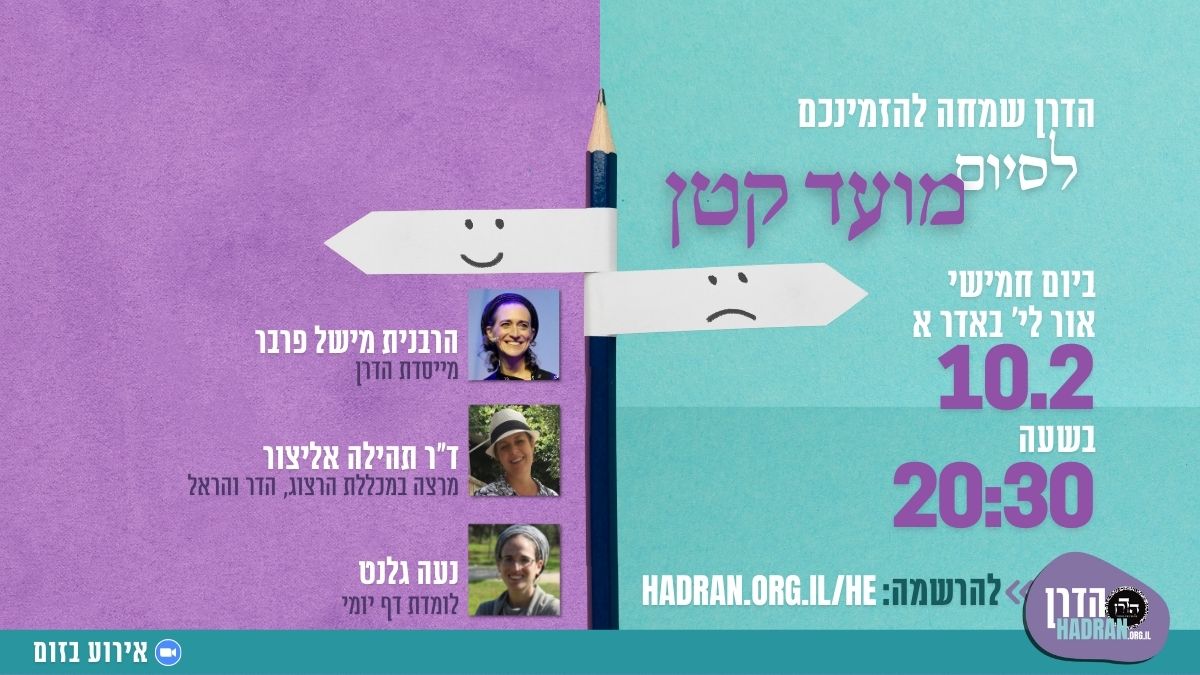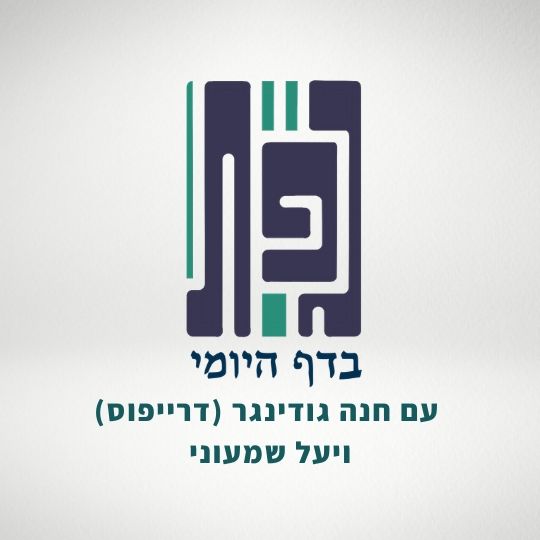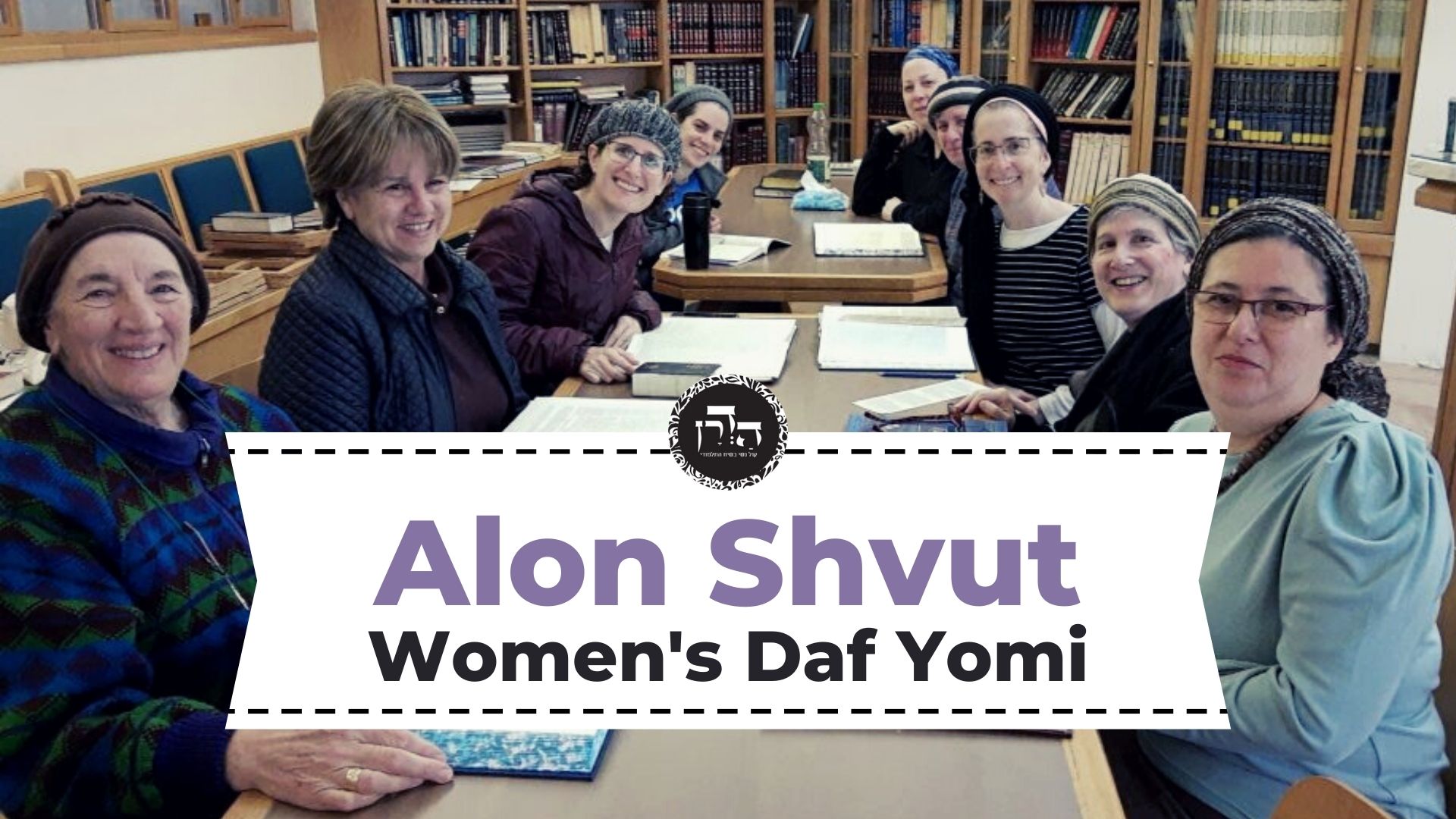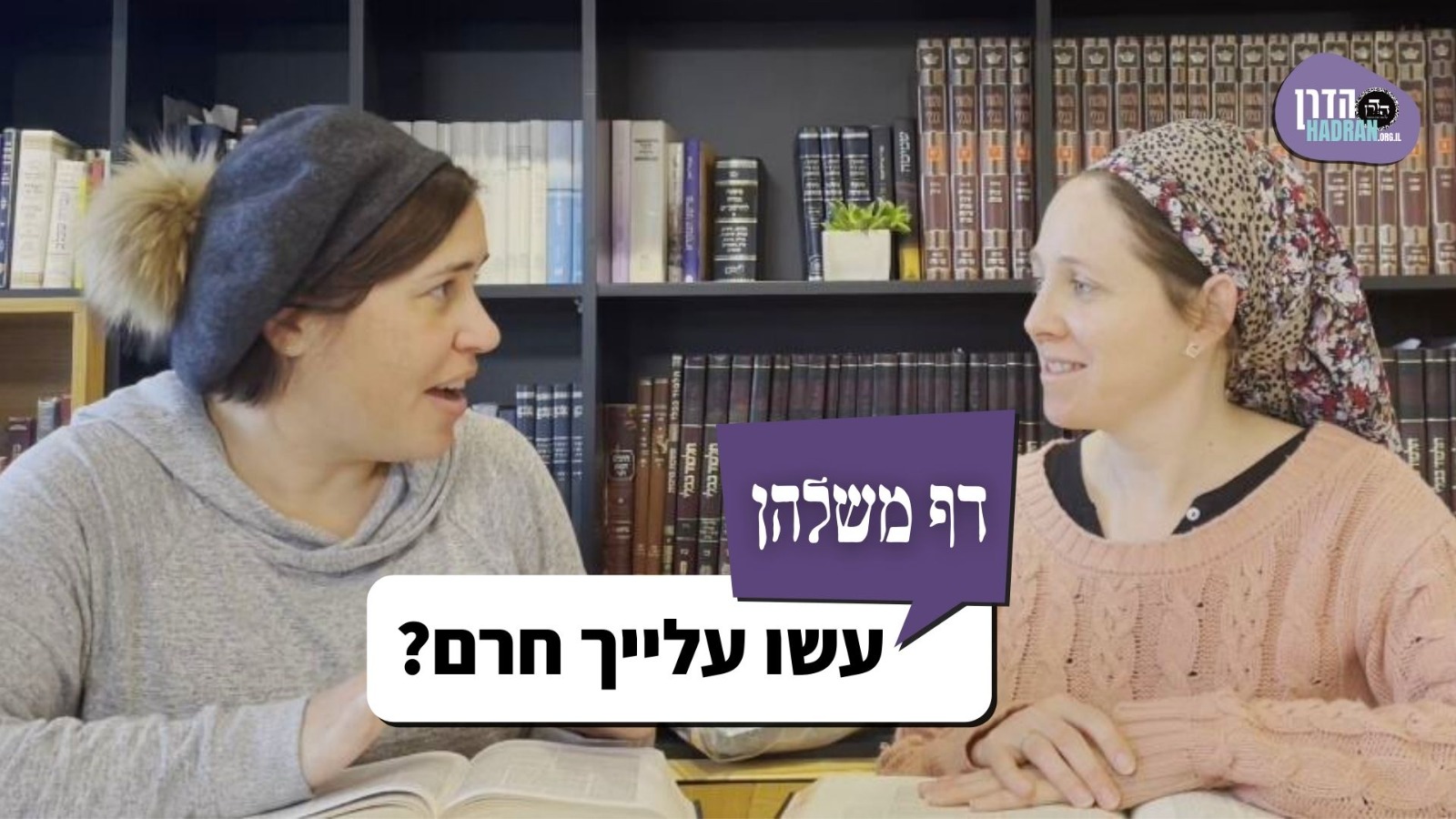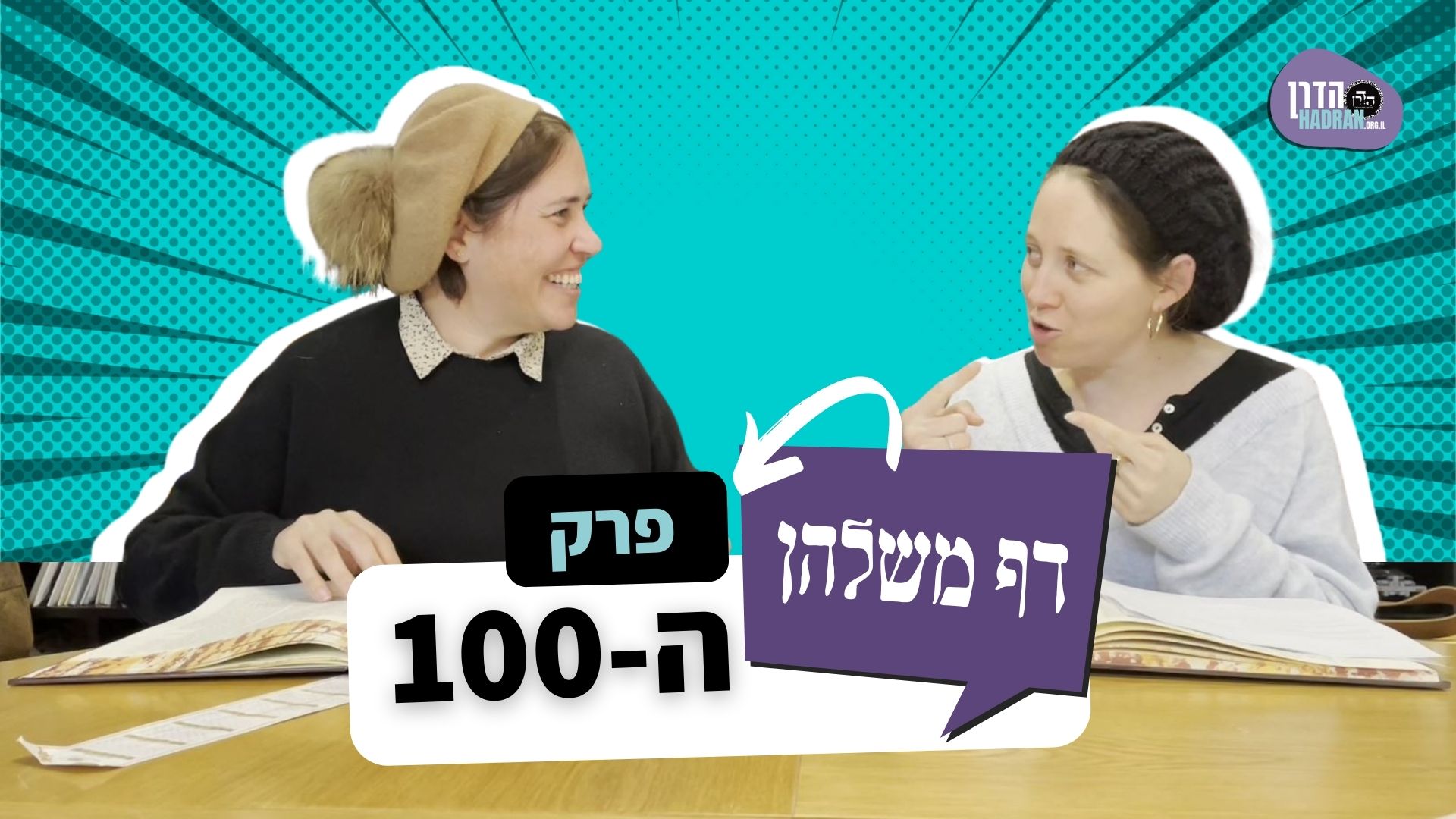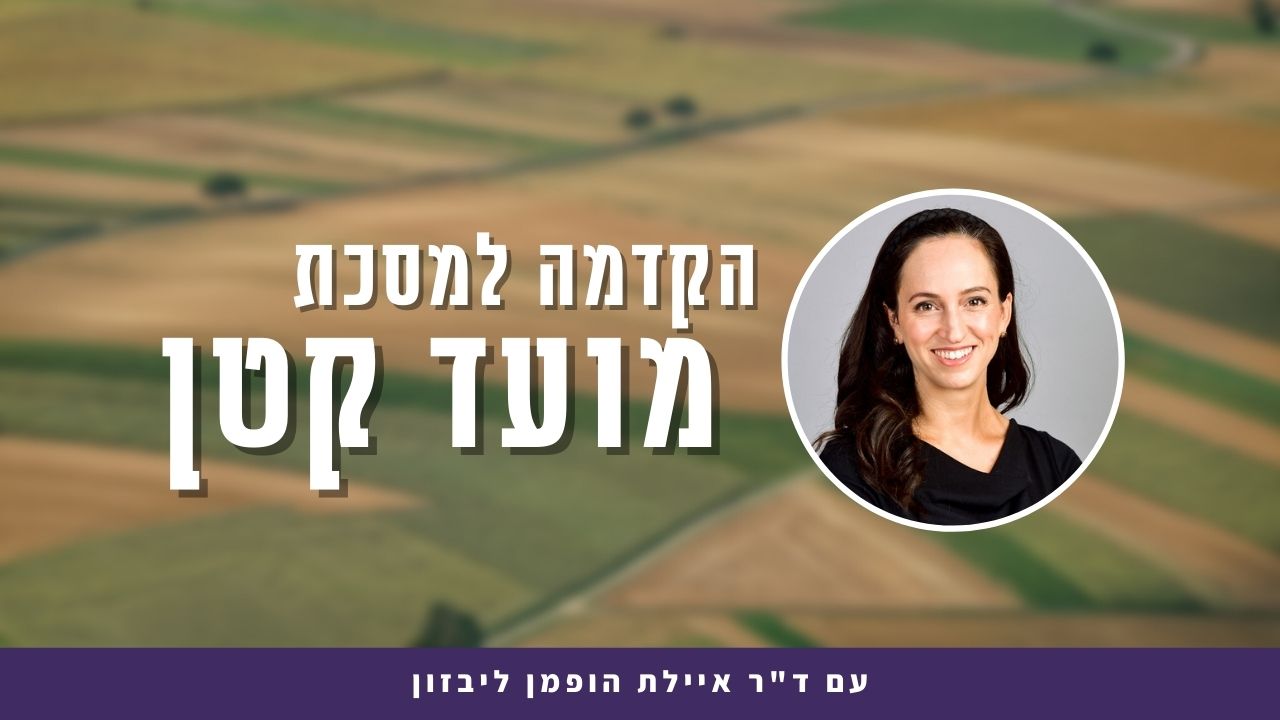רוצה להקדיש שיעור?
כלים
העמקה
רוצה להבין מה באמת קורה מתחת לפני השטח של הסוגיה?
שיעורים, פודקאסטים והרחבות של מיטב המורות שלנו יפתחו לך עוד זוויות וכיווני חשיבה.
חדשה בלימוד הגמרא?
זה הדף הראשון שלך? איזו התרגשות עצומה! יש לנו בדיוק את התכנים והכלים שיעזרו לך לעשות את הצעדים הראשונים ללמידה בקצב וברמה שלך, כך תוכלי להרגיש בנוח גם בתוך הסוגיות המורכבות ומאתגרות.
פסיפס הלומדות שלנו
גלי את קהילת הלומדות שלנו, מגוון נשים, רקעים וסיפורים. כולן חלק מתנועה ומסע מרגש ועוצמתי.
מועד קטן יא
לְיָרִיד שֶׁל גּוֹיִם, וְלוֹקְחִים בְּהֵמָה, עֲבָדִים וּשְׁפָחוֹת, בָּתִּים, שָׂדוֹת וּכְרָמִים, וְכוֹתֵב וּמַעֲלֶה בָּעַרְכָּאוֹת שֶׁלָּהֶן, מִפְּנֵי שֶׁהוּא כְּמַצִּיל מִיָּדָן.
to a fair of pagan gentiles held on a day they have designated for idol worship and buy animals, slaves, maidservants, houses, fields, and vineyards from them. And he may write the necessary deeds and confirm them in their courts [arkaot] by verifying the signatures on the documents to prevent the sellers from appealing and retracting the sale. Although this behavior might be construed as a display of respect for the gentiles and their idols, it is nevertheless permitted because it is as if he were rescuing his property from their hands, as he would not have another opportunity to acquire these items. This indicates that time-sensitive transactions are considered like cases where one might suffer financial loss, and are permitted.
רַב שְׁרָא לְחִיָּיא בַּר אָשֵׁי לְמִיגְדַּל אוּהָרִי בְּחוּלָּא דְמוֹעֲדָא. מַאי טַעְמָא — מַעֲשֵׂה הֶדְיוֹט הוּא, אֲבָל אִיזְלֵי — אָסוּר. מַאי טַעְמָא — מַעֲשֵׂה אוּמָּן הוּא.
It was related that Rav permitted Ḥiyya bar Ashi to weave simple traps [oharei] on the intermediate days of a Festival. The Gemara explains: What is the reason for this? It is because it is the work of a layman. However, complex nets [izlei] are prohibited. What is the reason? It is the work of a craftsman, which is prohibited on the intermediate days of a Festival.
רַב יְהוּדָה שְׁרָא לְאַמֵּי תַּנּוּרָאָה לְמִיגְדַּל תַּנּוּרֵי, וּלְרַבָּה בַּר עִשְׂבִּי לְמִיגְדַּל מַהוֹלָתָא. אִינִי? וְהָא תָּנֵי רַבָּה בַּר שְׁמוּאֵל: וְשָׁוִין שֶׁאֵין גּוֹדְלִין תַּנּוּר לְכַתְּחִילָּה! לָא קַשְׁיָא: כָּאן בִּימוֹת הַחַמָּה, כָּאן בִּימוֹת הַגְּשָׁמִים.
It was further related that Rav Yehuda permitted Ami the oven maker to construct ovens on the intermediate days of a Festival and Rabba bar Ashabi to craft sieves. The Gemara asks: Is that really so? Didn’t Rabba bar Shmuel teach the following baraita: And they all agree that one may not construct a new oven on the intermediate days of a Festival. The Gemara answers that this is not difficult: Here, where Rav Yehuda permitted constructing an oven, he was referring to the summer, i.e., when the weather is hot and dry, so the oven can dry out and already be fit for use on the Festival; there, where the baraita prohibits constructing an oven, it is referring to the rainy season, i.e., when the weather is such that the oven will not be ready for use on the Festival.
מַתְנִי׳ עוֹשִׂין מַעֲקֶה לַגַּג וְלַמִּרְפֶּסֶת מַעֲשֵׂה הֶדְיוֹט, אֲבָל לֹא מַעֲשֵׂה אוּמָּן. שָׁפִין אֶת הַסְּדָקִין וּמַעֲגִילִין אוֹתָן בַּמַּעֲגִילָה, בַּיָּד וּבָרֶגֶל אֲבָל לֹא בְּמַחְלָצַיִם.
MISHNA: One may construct a railing for a roof or a balcony if it is done in a nonprofessional manner, as the work of a layman, but not if it is done skillfully, as the work of a craftsman. One may plaster the cracks in an oven and roll over them with a roller, a wooden tool used to smooth out clay, with a hand or a foot, but not with a presser, a tool that is specially designed for this task.
הַצִּיר וְהַצִּינּוֹר וְהַקּוֹרָה וְהַמַּנְעוּל וְהַמַּפְתֵּחַ שֶׁנִּשְׁבְּרוּ — מְתַקְּנָן בַּמּוֹעֵד, וּבִלְבַד שֶׁלֹּא יִתְכַּוֵּין לַעֲשׂוֹת מְלַאכְתּוֹ בַּמּוֹעֵד.
With regard to the hinge of a door, and the cylinder of the hinge, and the cross beam that holds the door, and a lock and a key that broke, one may fix them on the intermediate days of a Festival as these items are essential for the Festival and their repair cannot be delayed. This is permitted, provided that he does not intend ahead of time to do his labor on the Festival and delay it until that time.
וְכׇל כְּבָשִׁין שֶׁהוּא יָכוֹל לֶאֱכוֹל מֵהֶן בַּמּוֹעֵד כּוֹבְשָׁן.
And with regard to all preserved food from which one can eat on the Festival, since they become ready to be eaten in a short amount of time, he may preserve them on the intermediate days of a Festival.
גְּמָ׳ הֵיכִי דָמֵי מַעֲשֵׂה הֶדְיוֹט? רַב יוֹסֵף אָמַר: בְּהוּצָא וְדַפְנָא. בְּמַתְנִיתָא תָּנָא: צָר בִּצְרוֹר וְאֵינוֹ טָח בְּטִיט.
GEMARA: The Gemara asks: What are the circumstances in which a railing is considered the work of a layman? Rav Yosef said: When it is made with palm branches and the branches of bay trees, which do not create a permanent structure. It was taught in a baraita that he fills in the space with stone but he does not plaster the stones with clay.
שָׁפִין אֶת הַסְּדָקִין וּמַעֲגִילִין אוֹתָן בַּמַּעֲגִילָה. הַשְׁתָּא בְּמַעֲגִילָה אָמְרַתְּ שְׁרֵי — בַּיָּד וּבָרֶגֶל מִיבַּעְיָא? הָכִי קָאָמַר: שָׁפִין אֶת הַסְּדָקִין וּמַעֲגִילִין אוֹתָן כְּעֵין מַעֲגִילָה, בַּיָּד וּבָרֶגֶל, אֲבָל לֹא בְּמַחְלָצַיִם.
It was taught in the mishna: One may plaster the cracks in an oven and roll over them with a roller, with a hand or a foot, but not with a presser. The Gemara asks: Now that you said that it is permitted to roll over the cracks with a roller, is it necessary to say that one may plaster the cracks with a hand or a foot? The Gemara answers that this is what the mishna is saying: One may plaster the cracks in an oven and roll over them as if with a roller, meaning with a hand or a foot, but not with a presser, which is a craftsman’s tool made especially for this.
הַצִּיר וְהַצִּינּוֹר וְהַקּוֹרָה וְהַמַּנְעוּל וְהַמַּפְתֵּחַ שֶׁנִּשְׁבְּרוּ — מְתַקְּנָן בַּמּוֹעֵד. וּרְמִינְהִי: עַד יָמָיו הָיָה פַּטִּישׁ מַכֶּה בִּירוּשָׁלַיִם כּוּ׳. עַד יָמָיו — אִין, מִכָּאן וְאֵילָךְ — לָא!
It was taught in the mishna: With regard to the hinge of a door, and the cylinder of the hinge, and the cross beam that holds the door, and a lock and a key that broke, one may fix them on the intermediate days of a Festival. The Gemara raises a contradiction to this from a different mishna (Ma’aser Sheni 5:15): Until the days of Yoḥanan the High Priest, workmen’s hammers would beat in Jerusalem on the intermediate days of a Festival. One can deduce from this mishna that until his days, yes, the workmen’s hammers would beat, but from then on, no, because Yoḥanan the High Priest banned such work. This seems to contradict the mishna here that permits fixing certain items on the intermediate days of the Festival.
לָא קַשְׁיָא: כָּאן בִּדְנַפָּחֵי, כָּאן בִּדְנַגָּרֵי.
The Gemara answers: This is not difficult: There, when it is prohibited, it is referring to the work of smiths, which generates a great deal of noise; here, where it is permitted, it is referring to the work of carpenters, which is much quieter.
מַתְקֵיף לַהּ רַב חִסְדָּא: יֹאמְרוּ, קָלָא רַבָּה — אֲסִיר, קָלָא זוּטְרָא — שְׁרֵי! אֶלָּא אָמַר רַב חִסְדָּא, לָא קַשְׁיָא: הָא — בְּמַגָּלֵי, הָא — בַּחֲצִינֵי. רַב פָּפָּא אָמַר: כָּאן — קוֹדֶם גְּזֵירָה, כָּאן — לְאַחַר גְּזֵירָה.
Rav Ḥisda strongly objects to this: If so, people will say that a loud noise is prohibited, but a soft noise is permitted. Rather, Rav Ḥisda said that the apparent contradiction is not difficult for a different reason: This mishna that permits labor is referring to sickles, as sickles emit no noise at all; whereas that mishna that prohibits labor is referring to chisels. Rav Pappa said: Here in the mishna it is referring to the period before the decree of Yoḥanan the High Priest; whereas there in the other mishna it is referring to the period after the decree.
רַב אָשֵׁי אָמַר: הָא — רַבִּי יְהוּדָה, הָא — רַבִּי יוֹסֵי. דְּאָמַר רַבִּי יִצְחָק בַּר אַבְדִּימִי: מַאן תַּנָּא שִׁינּוּי בַּמּוֹעֵד בְּדָבָר הָאָבֵד — דְּלָא כְּרַבִּי יוֹסֵי.
Rav Ashi said: That mishna, which prohibits this labor, was taught in accordance with the opinion of Rabbi Yehuda; while this mishna was taught in accordance with the opinion of Rabbi Yosei. As Rabbi Yitzḥak bar Avdimi said: Who is the tanna who taught that all labor performed on the intermediate days of a Festival must be done with a change, i.e., in an altered manner, even with regard to a matter that will be lost if timely action is not taken? It is not in accordance with the opinion of Rabbi Yosei, as Rabbi Yosei permits doing labor that will prevent financial loss even when it is done in the usual manner.
אָמַר רָבִינָא: כְּמַאן מְדַלִּינַן הָאִידָּנָא קִבְּיוָתָא דְּדַשָּׁא בְּחוּלָּא דְמוֹעֲדָא, כְּמַאן — כְּרַבִּי יוֹסֵי.
Ravina said: In accordance with whose opinion do we now lift the lintel above the door in order to drive in the nails that had loosened on the intermediate days of a Festival in the usual manner? In accordance with whose opinion is this done? It is done in accordance with the opinion of Rabbi Yosei, who permits labor that will prevent financial loss even when it is done in the usual manner.
כְּבָשִׁין שֶׁהוּא יָכוֹל לֶאֱכוֹל בַּמּוֹעֵד — כּוֹבְשָׁן. בְּדִיתָא לְבַאי כְּווֹרֵי, אֲזוּל כּוּלֵּי עָלְמָא צוּד אַיְיתוֹ כְּווֹרֵי, שְׁרָא לְהוּ רָבָא לְמִימְלַח מִינַּיְיהוּ.
§ It was taught in the mishna: With regard to all preserved food from which he can eat on the Festival, he may preserve them on the intermediate days of a Festival. The Gemara relates that the Bedita River once overflowed, depositing large quantities of fish in small water deposits on the river bank on the intermediate days of a Festival. Everyone went and trapped and brought home fish, and Rava permitted them to salt some of the fish.
אֲמַר לֵיהּ אַבָּיֵי, וְהָא תְּנַן: כְּבָשִׁין שֶׁהוּא יָכוֹל לֶאֱכוֹל מֵהֶן בַּמּוֹעֵד — כּוֹבְשָׁן! אֲמַר לֵיהּ: כֵּיוָן דְּמֵעִיקָּרָא אַדַּעְתָּא דַאֲכִילָה אַיְיתִינְהוּ, וְאִי שָׁבֵיק לְהוּ פָּסְדִי, כִּפְרַקְמַטְיָא הָאָבֵד דָּמֵי, וּשְׁרֵי.
Abaye said to him: Didn’t we learn in the mishna: With regard to all preserved food from which he can eat on the Festival, he may preserve them on the intermediate days of a Festival? In this case it was impossible to eat that much fish on the Festival, and therefore preserving them should have been prohibited. Rava said to him: Since they initially brought these fish with the intention of eating them on the Festival, and it only became clear afterward that they had brought too many, and if one would leave them without salting them they would be ruined, they are treated like merchandise that will be lost, and therefore preserving them is permitted.
וְאִיכָּא דְּאָמְרִי, שְׁרָא לְהוּ רָבָא מֵיצָד מֵיזָל אַיְיתוֹיֵי וּמִימְלָח. אֲמַר לֵיהּ אַבָּיֵי: וְהָא אֲנַן, כְּבָשִׁין שֶׁהוּא יָכוֹל לֶאֱכוֹל מֵהֶן כּוֹבְשָׁן תְּנַן!
And some say that it did not happen in this manner, rather, Rava permitted them to trap the fish, to bring them home, and to salt them. Abaye said to him: Didn’t we learn in the mishna: With regard to all preserved food from which he can eat on the Festival, he may preserve them on the intermediate days of a Festival? These fish were heavily salted and consequently could not be eaten until they thoroughly dried out.
אֲמַר לֵיהּ: הָנֵי נָמֵי מִיתְאַכְלִי אַגַּב אִיצָצָא. כִּי הָא דִּשְׁמוּאֵל עֲבַדוּ לֵיהּ שִׁיתִּין אִיצָצֵי וַאֲכַל. רָבָא אִיקְּלַע לְבֵי רֵישׁ גָּלוּתָא, עָבְדִי לֵיהּ שִׁיתִּין אִיצָצֵי וַאֲכַל.
Rava said to him: These fish that were just salted can also be eaten now, by pressing out the salt and brine, and therefore, they too are fit to be eaten on the Festival, as in that case of Shmuel, where they prepared recently salted fish for him by pressing it sixty times and he ate the fish. The Gemara relates that Rava happened to come to the house of the Exilarch and they prepared freshly salted fish for him by pressing it sixty times, and he ate it.
רַב אִיקְּלַע לְבֵי רַב שַׁפִּיר, אַיְיתוֹ לְקַמַּיְיהוּ הָהוּא כְּווֹרָא תִּילְתָּא בִּישּׁוּלָא תִּילְתָּא מִילְחָא וְתִילְתָּא טַוְויָא.
Apropos eating fish in various ways, the Gemara relates that Rav once happened to come to the house of Rav Shapir, and they brought before him a certain fish, of which one- third was cooked, one-third was salted and made edible via pressing, and one-third was broiled.
אָמַר רַב: אֲמַר לִי אַדָּא צַיָּידָא, כְּווֹרָא סָמוּךְ לְמִיסְרְחֵיהּ מְעַלֵּי. וְאָמַר רַב, אֲמַר לִי אַדָּא צַיָּידָא: כְּווֹרָא, טַוְויָיא בַּאֲחוּהּ, אַסּוֹקֵיהּ בַּאֲבוּהּ, מֵיכְלֵי[הּ] בִּבְרֵיהּ, מִשְׁתֵּי עֲלֵיהּ אֲבוּהּ.
Rav said: Adda the fisherman told me that a fish that has sat for some time and is close to spoiling is at its best. And Rav also said: Adda the fisherman told me: With regard to a fish, broil it with its brother, i.e., with salt, which, like fish, also comes from the sea; place it in its father, i.e., in water; and eat it with its son, i.e., with fish brine which comes from it; and drink after it its father, i.e., water.
וְאָמַר רַב, אֲמַר לִי אַדָּא צַיָּידָא: כְּווֹרָא, תַּחְלֵי, וַחֲלָבָא — לִיטְעוֹן גּוּפָא וְלָא לִיטְעוֹן פּוּרְיָא. וְאָמַר רַב, אֲמַר לִי אַדָּא צַיָּידָא: כְּווֹרָא, תַּחְלֵי, וַחֲלָבָא — מַיָּא וְלָא שִׁיכְרָא, שִׁיכְרָא וְלָא חַמְרָא.
And in addition Rav said: Adda the fisherman told me: After eating fish, cress, and milk, let the body carry them and let not the bed carry them, i.e., it is advisable to go for a walk after eating them, rather than immediately going to sleep. And Rav said: Adda the fisherman told me: After eating fish, cress, and milk, it is better to drink water and not beer, and if he has no water, he should drink beer and not wine, in order to avoid harming his body.
הֲדַרַן עֲלָךְ מַשְׁקִין בֵּית הַשְּׁלָחִין
MISHNA: The mishna discusses one who had already turned over his olives as part of the process of preparing them for pressing, and mourning for a close relative befell him and as a result he was prohibited from engaging in work, or some other unavoidable accident occurred, or his workers misled him, promising to come but failing to do so, so that he could not press his olives before the Festival. Under these circumstances, during the intermediate days of the Festival, he may place the olives in the press and load the beam with weights for the initial pressing of the olives and leave it this way until after the Festival; this is the statement of Rabbi Yehuda.
מִי שֶׁהָפַךְ אֶת זֵיתָיו וְאֵירְעוֹ אֵבֶל אוֹ אוֹנֶס, אוֹ שֶׁהִטְעוּהוּ פּוֹעֲלִים — טוֹעֵן קוֹרָה רִאשׁוֹנָה וּמַנִּיחָהּ לְאַחַר הַמּוֹעֵד, דִּבְרֵי רַבִּי יְהוּדָה.
Rabbi Yosei says: He may press the olives and complete the process and then plug each barrel of oil in its usual manner. Since delay can entail financial loss, the Sages did not require him to alter the normal process of extracting the oil.
רַבִּי יוֹסֵי אוֹמֵר: זוֹלֵף וְגוֹמֵר, וְגָף כְּדַרְכּוֹ.
GEMARA: The Gemara asks: The tanna opens the mishna with a case of mourning and ends it with the halakhot of the intermediate days of the Festival, leaving the connection between them unclear. Rav Sheisha, son of Rav Idi, said: That is to say: Actions that are permitted on the intermediate days of a Festival are prohibited during the days of one’s mourning. Therefore, if a mourning period befell one before the Festival, and he could not prepare properly for the Festival due to the prohibition against performance of labor by a mourner, he is permitted to perform labor during the intermediate days of the Festival to avoid financial loss.
גְּמָ׳ פָּתַח בְּאֵבֶל וְסִיֵּים בַּמּוֹעֵד. אָמַר רַב שִׁישָׁא בְּרֵיהּ דְּרַב אִידִי זֹאת אוֹמֶרֶת: דְּבָרִים הַמּוּתָּרִין בַּמּוֹעֵד, אֲסוּרִים בִּימֵי אֶבְלוֹ.
Rav Ashi said that the tanna of the mishna is speaking utilizing the didactic style of: It is not necessary, and he is teaching two separate halakhot, one about mourning and the other about the Festival: It is not necessary to state that during the days of his mourning, when the prohibition against labor is rabbinic, it is permitted to perform labor that, if delayed, could cause serious loss; but even on the intermediate days of the Festival, when the prohibition against performing labor is by Torah law, performing such labor is permitted because in a case of a loss the Sages permitted it.
רַב אָשֵׁי אָמַר, לָא מִיבַּעְיָא קָאָמַר: לָא מִיבַּעְיָא בִּימֵי אֶבְלוֹ, דְּמִדְּרַבָּנַן הוּא וּשְׁרֵי, אֶלָּא אֲפִילּוּ בַּמּוֹעֵד, דְּאִיסּוּר מְלָאכָה מִדְּאוֹרָיְיתָא בִּמְקוֹם פְּסֵידָא — שָׁרוּ רַבָּנַן.
The Gemara comments: It is taught in a baraita in accordance with the opinion of Rav Sheisha, son of Rav Idi: These are actions that others perform for the mourner during the days of his mourning: If his olives have already been turned over, they may load them for him into the olive press, and likewise if his cask needs to be plugged, or if his flax needs to be lifted out of the soaking pool where it will rot if not removed in time, or if his wool needs to be lifted from the cauldron into which it was placed for dyeing, they perform all these actions for him. They also irrigate his field when his turn for water arrives, as in many places, each field would receive water in turn according to a prearranged schedule. If one does not utilize the water when his turn arrives, he loses that water. This supports Rav Sheisha’s opinion that the prohibition against performing labor is waived in cases of loss only on the Festival. Under such circumstances, labor is prohibited to a mourner and in cases of loss may only be performed for him by others.
תַּנְיָא כְּווֹתֵיהּ דְּרַב שִׁישָׁא בְּרֵיהּ דְּרַב אִידִי. אֵלּוּ דְּבָרִים הָעוֹשִׂין לָאָבֵל בִּימֵי אֶבְלוֹ: זֵיתָיו הֲפוּכִין — טוֹעֲנִין לוֹ, וְכַדּוֹ לָגוּף וּפִשְׁתָּנוֹ לְהַעֲלוֹת מִן הַמִּשְׁרָה, וְצַמְרוֹ לְהַעֲלוֹת מִן הַיּוֹרָה, וּמַרְבִּיצִים שָׂדֵהוּ מִשֶּׁתַּגִּיעַ עוֹנַת הַמַּיִם שֶׁלּוֹ.
The baraita continues: Rabbi Yehuda says: They also sow for him a plowed field or a field set aside for flax, where the time of sowing is critical. If the field is sown later, it will cause a loss. The Sages said to him: If that field is not sown in the early season, it can be sown in the later season; and similarly, if it is not sown with flax, it can be sown with another species. Therefore, this is not considered a great loss, and the Sages did not permit it.
רַבִּי יְהוּדָה אוֹמֵר: אַף זוֹרְעִין לוֹ שְׂדֵה נִיר וְשָׂדֶה הָעוֹמֶדֶת לְפִשְׁתָּן. אָמְרוּ לוֹ: אִם לֹא תִּזָּרַע בְּבַכִּיר — תִּזָּרַע בְּאָפִל, אִם לֹא תִּזָּרַע פִּשְׁתָּן — תִּזָּרַע מִמִּין אַחֵר.
Rabban Shimon ben Gamliel says: If his olives have already been turned over and there is no skilled worker available who knows how to press them properly but him, or his cask needs to be plugged and there is no skilled worker available but him, or his flax needs to be lifted out of the soaking pool, or his wool needs to be lifted from the cauldron, and there is no skilled worker available but him, he may perform all of these actions himself in private.
רַבָּן שִׁמְעוֹן בֶּן גַּמְלִיאֵל אוֹמֵר: זֵיתָיו הֲפוּכִין וְאֵין שָׁם אוּמָּן אֶלָּא הוּא, כַּדּוֹ לָגוּף וְאֵין שָׁם אוּמָּן אֶלָּא הוּא, פִּשְׁתָּנוֹ לְהַעֲלוֹת מִן הַמִּשְׁרָה וְצַמְרוֹ לְהַעֲלוֹת מִן הַיּוֹרָה וְאֵין שָׁם אוּמָּן אֶלָּא הוּא — הֲרֵי זֶה יַעֲשֶׂה בְּצִינְעָא.
Rabban Shimon ben Gamliel said further: If this mourner was a craftsman who serves the public, providing a necessary service, or a barber or a bath attendant for the public, and the time of the Festival arrived, i.e., it was the eve of a Festival, and there is no other skilled worker available but him, then he may perform the labor even in public, as the needs of the public takes precedence over the mourning of an individual.
יָתֵר עַל כֵּן אָמַר רַבָּן שִׁמְעוֹן בֶּן גַּמְלִיאֵל: אִם הָיָה אוּמָּן לָרַבִּים, וְסַפָּר וּבַלָּן לָרַבִּים, וְהִגִּיעַ עֵת הָרֶגֶל וְאֵין שָׁם אוּמָּן אֶלָּא הוּא — הֲרֵי זֶה יַעֲשֶׂה.
The baraita continues: Tenant farmers, who farm others’ land in exchange for a certain percentage of the crop, and leasers, who work the land in exchange for a fixed amount of the crop, and contractors, who work the land in exchange for a set amount of money, are included amongst those for whom others may perform their labor when they are in mourning. In contrast, donkey drivers, camel drivers, and sailors are those for whom others may not perform their work during their mourning periods. However, if they or their animals were leased or hired out to others, then they may perform work, because they were hired personally and cannot be replaced without loss. A day laborer, even if he is in a different city where his mourning status is not public knowledge, may not perform his work. If a commission for others was his responsibility, even if it was by contract and he was paid not by the day but upon its completion, he may not perform that labor.
הָאֲרִיסִין וְהַחֲכִירִין וְהַקַּבְּלָנִין — הֲרֵי אֵלּוּ יַעֲשׂוּ אֲחֵרִים בִּשְׁבִילָן. הַחַמָּרִין הַגַּמָּלִין וְהַסַּפָּנִין — הֲרֵי אֵלּוּ לֹא יַעֲשׂוּ, וְאִם הָיוּ מוּחְכָּרִין אוֹ מוּשְׂכָּרִין אֵצֶל אֲחֵרִים — הֲרֵי אֵלּוּ יַעֲשׂוּ. שְׂכִיר יוֹם אֲפִילּוּ בְּעִיר אַחֶרֶת — לֹא יַעֲשֶׂה. הָיְתָה מְלֶאכֶת אֲחֵרִים בְּיָדוֹ, אַף עַל פִּי שֶׁבְּקִיבּוֹלֶת — לֹא יַעֲשֶׂה.
The statement in the baraita that one may not perform a task for others even if it was by contract implies that it is not necessary to state that if it was not by contract the work is prohibited to a mourner. The Gemara asks: On the contrary, when he works by contract it is considered as though it were his own work, since he simply receives payment for the completed task. Non-contracted labor, where he is paid for the time he works, is not viewed as his own and it is conceivable that it would be permitted during his mourning period. The Gemara concludes: Rather, emend the text and say that the baraita should read: If a commission for others was his responsibility, whether by contract or not by contract, he may not perform it.
אַף עַל פִּי שֶׁבְּקִיבּוֹלֶת, וְלָא מִיבַּעְיָא שֶׁאֵינָהּ קִיבּוֹלֶת?! אַדְּרַבָּה, קִיבּוֹלֶת כְּדִידֵיהּ דָּמֵי! אֶלָּא אֵימָא: בֵּין קִיבּוֹלֶת בֵּין שֶׁאֵינָהּ קִיבּוֹלֶת — לֹא יַעֲשֶׂה.
The baraita continues: If he commissioned others to perform his work, then if it was in his house they may not perform the work, but if it was in another house they may perform it.
הָיְתָה מְלַאכְתּוֹ בְּיַד אֲחֵרִים, בְּבֵיתוֹ — לֹא יַעֲשׂוּ, בְּבַיִת אַחֵר — יַעֲשׂוּ.
The Gemara relates that Maryon, son of Ravin, and Mar, son of Rav Aḥa, son of Rava, held a team of two oxen in partnership between them, one ox apiece. An event, i.e., a death in the family, befell Mar, son of Rav Aḥa, son of Rava, and he detached his ox from the team, preventing any work from being performed by the team, because he did not want work performed with his animal during his days of mourning. Rav Ashi said: A distinguished man like Mar, son of Rav Aḥa, is behaving this way? Granted, he is not concerned about his own loss, but is he not concerned about the loss of others, i.e., his partner? Isn’t it taught in the baraita cited above: If they or their animals were hired out or leased to others, then they may perform their work? In that case, why not allow the partner to work with the animal of Mar, son of Rav Aḥa?
מָרִיּוֹן בְּרֵיהּ דְּרָבִין וּמָר בְּרֵיהּ דְּרַב אַחָא בְּרֵיהּ דְּרָבָא הֲוָה לְהוּ הַהוּא גַּמְלָא דְתוֹרָא בַּהֲדֵי הֲדָדֵי. אִיתְּרַעָא בֵּיהּ מִילְּתָא בְּמָר בְּרֵיהּ דְּרַב אַחָא בְּרֵיהּ דְּרָבָא וּפַסְקֵיהּ לְגַמְלֵיהּ. אָמַר רַב אָשֵׁי: גַּבְרָא רַבָּה כְּמָר בְּרֵיהּ דְּרַב אַחָא עָבֵיד הָכִי? נְהִי דְּלִפְסֵידָא דִּידֵיהּ לָא חָיֵישׁ, אַדַּאֲחֵרִים לָא חָיֵישׁ?! וְהָא תַּנְיָא: אִם הָיוּ מוּשְׂכָּרִין אוֹ מוּחְכָּרִין אֵצֶל אֲחֵרִים — הֲרֵי אֵלּוּ יַעֲשׂוּ!
The Gemara explains: But Mar, son of Rav Aḥa, maintains: An important person is different. Even if strictly speaking something is permitted, an important person must be more rigorous with himself, so that people learn not to take the halakha lightly.
וְהוּא סָבַר: אָדָם חָשׁוּב שָׁאנֵי.

